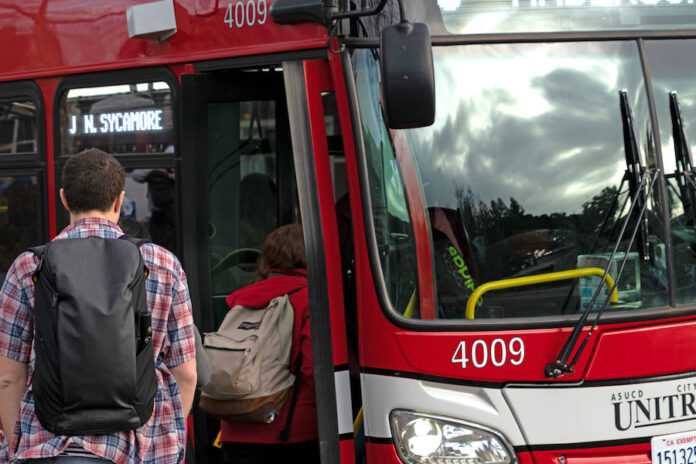New buses allow for higher capacity, increased service
Unitrans recently acquired two new double-decker buses. With these buses, the unit is able to increase the capacity of passengers, and Unitrans will be able to increase services on its most used routes.
The two buses come at a time when Unitrans is looking to expand its operations and improve its efforts in having higher capacity buses. It is also working toward more environmentally sound methods of transportation, including its vision of moving to all electric buses in the future.
According to Jeffrey Flynn, the general manager of Unitrans, the two new buses were acquired through a joint contact with AC Transit based in Oakland, Calif.
The buses were manufactured by the same company that produced the modern double-decker buses that Unitrans currently has. These new buses bring the total of modern double-decker buses that Unitrans operates to four.
Weston Snyder, the operations manager for Unitrans, made it clear where the money for the buses came from.
“The money for them came from grants, no student fees,” Snyder said.
With these new buses, Unitrans is aiming for efficiency: it is looking to increase capacity on routes without having to use more buses.
“We’ll be expanding modern double-decker service to the G line and we’ll be able to more consistently operate double-decker service on the J and the V lines,” Flynn said.
These new Unitrans buses will also prevent breakdowns. Snyder explained that having four double-decker buses will allow for a more efficient rotation, where the buses that need repairs and maintenance can be pulled from the rotation while still having multiple buses running routes.
Previously, Snyder said that when double-decker buses were pulled out of operation, single-deck buses were used to compensate. This practice is incapable of meeting the demand of passengers.
“Our V and J line passengers would have days where they would have a single-deck bus when normally they have a double-decker, and the bus would fill up,” Snyder said
As Unitrans looks to expand, the double-decker is continuing to stay within its sights.
“Our current growth strategy is to introduce more high-capacity buses like these as we replace older single-deck buses,” Flynn said.
Snyder also commented on how higher capacity buses would help Unitrans achieve its goal of ultimate growth.
“They will help us keep up with the expanding student body of Davis,” Snyder said. “As this will mean more people living in Davis and more Unitrans riders, we can have larger buses available to handle the passenger loads.”
Elizabeth Chavez, a second-year cognitive science major, weighed in on Unitrans’ new purchases.
“I think it’s a good thing,” Chavez said. “I like the idea of bigger buses. You hear a lot of complaints about there not being enough space on the buses and visually seeing that Unitrans is doing something about it makes you feel like your voice is heard.”
As far as what else to expect for Unitrans going forward, there are two projects that Unitrans is currently looking to push.
“We’re working hard now to improve service and reintroduced midday 15-minute service on our most popular lines, — the D, G, J, W and V lines — add more capacity buses and reduce breakdowns in time for Fall 2019,” Flynn said.
The other push is what Flynn calls “capital related.” This push is for Unitrans to introduce electric buses.
The movement toward electric buses initially started in 2017, when Unitrans began exploring a possible transition. The reason for this is that Unitrans wishes to support the university’s and the City of Davis’ greenhouse gas reduction goals.
Based on preliminary engineering and cost estimates, the upgrade to electrical capacity will cost around $3 million, and the purchasing of 12 new electric buses would cost between $9 and $10 million. After these estimates, Unitrans began to pursue funding for this project.
Last quarter, Unitrans was awarded around $3.7 million in funding through a regional transportation funding agency called the Sacramento Area Council of Governments (SACOG).
After this initial acquisition of electric buses in the near future, Unitrans will look to only buy electric buses.
According to Unitrans, the transportation service is continuing to pursue up to $10 million in funding for the buses and is continuing its research regarding the best electric bus technology.
“This funding will allow us to improve our facility to handle electric charging and install chargers,” Flynn said. “We hope to replace 12 old buses with new electric buses by 2022-2023, which accounts for 25 percent of the current bus fleet.”
The idea of electric buses is something that passengers as well as Unitrans are looking forward to. Chavez had a very clear opinion on the initiative.
“It’s honestly a step forward — there is obviously many people concerned with the environment and knowing that there are current efforts here in Davis to protect our environment while increasing the bus services is really a win-win situation for everyone,” Chavez said.
With the new double-decker buses, there are many passengers who are looking forward to a smoother commute to school or to any of their destinations.
“It would really help anyone who uses the bus to get around Davis,” Chavez said. “For me personally, it seems like it would make commuting easier, and I guess peace of mind knowing that the chances of me being late for something out of my control has decreased.”
Written by: Alexis Lopez-Perez — campus@theaggie.org









